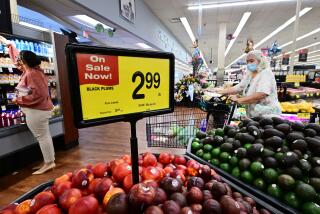Consumer debt jumps in March
- Share via
Consumer borrowing increased in March by the most in four months as Americans charged more purchases to their credit cards and took out more car loans, Federal Reserve figures released Monday showed.
Consumer credit, or non-mortgage loans to individuals, increased $13.5 billion, or an annual rate of 6.7%, to $2.425 trillion, the Fed said. In February, consumer debt rose $5.6 billion.
Consumers faced with tapped-out home-equity loans and falling real estate values may be turning to credit cards, which typically have higher interest rates, to keep spending. Gary Thayer, chief economist at A.G. Edwards & Co. in St. Louis, said low unemployment was also providing support for consumer spending, which accounts for two-thirds of the nation’s economic growth.
“The jobs situation is favorable and people probably have the income to spend with the jobs still growing but at a modest pace,” Thayer said before the report. “We’ll probably see modest spending growth going forward.”
The increase for March was the largest since a $20.1-billion gain in November, according to Fed statistics.
Revolving debt, such as credit cards, rose $6.8 billion in March after rising $2.2 billion a month earlier, Fed data showed. Nonrevolving debt, such as auto loans and mobile home loans, rose $6.7 billion for the month after increasing $3.4 billion in February.
Economists had forecast that the Fed’s report would show an increase of $4 billion in consumer credit in March, after February’s initially reported increase of $3 billion, according to the median estimate in a Bloomberg News survey of 37 economists.
Credit card issuers continue to benefit from a surge in consumers’ use of credit and debit cards. MasterCard Inc. announced May 2 that first-quarter profit climbed 70% to a record. Transactions jumped 19% as consumers continued to switch to credit and debit cards from cash and checks, according to the Purchase, N.Y.-based company.
At the same time, the housing slump crippled some borrowers. Home foreclosures rose 46.8% in March from a year earlier, according to a RealtyTrac Inc. report. An estimated 1 in every 775 homes is in some stage of foreclosure.
Moreover, sub-prime mortgages to borrowers with poor or limited credit histories almost doubled to $640 billion in 2006 from $332 billion in 2003, according to the newsletter Inside B&C; Lending.
More to Read
Inside the business of entertainment
The Wide Shot brings you news, analysis and insights on everything from streaming wars to production — and what it all means for the future.
You may occasionally receive promotional content from the Los Angeles Times.









